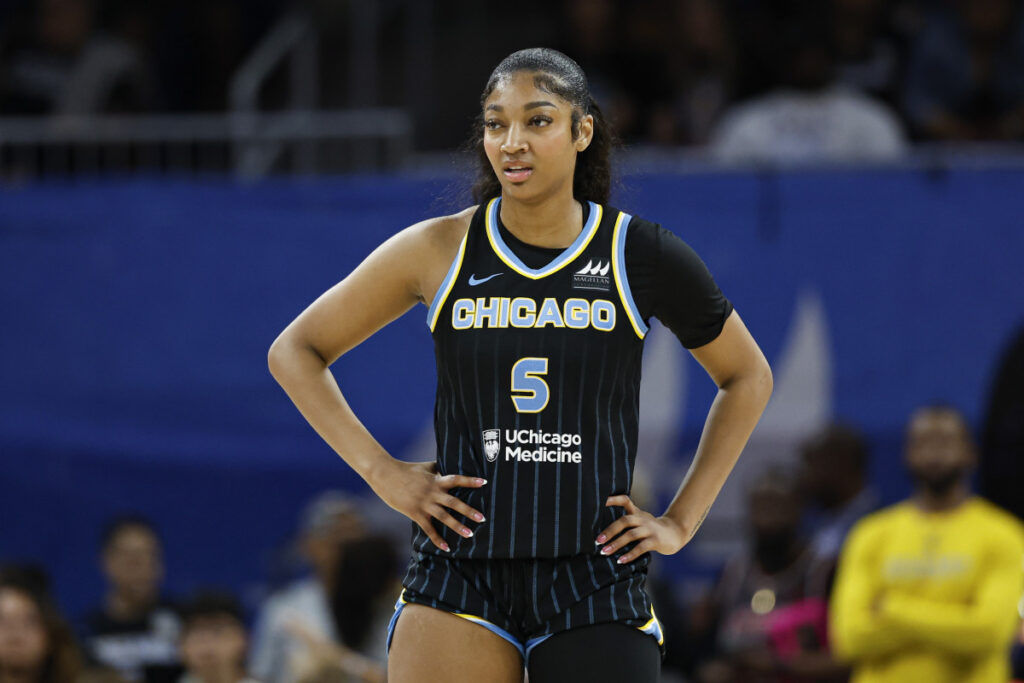The growth of the NBA was a well-documented step-by-step plan. Women’s basketball is now following the same playbook toward general relevancy, and one player is walking the path to being its most transcendent figure.
In 2024, with each passing Caitlin Clark long-range three-point bomb, the world was turning its head. A legendary championship game against LSU the year prior sparked a rivalry between former Tiger center Angel Reese and Clark, bred in race relations akin to that of Magic Johnson and Larry Bird. The social subtext undercurrent was the same. The world pitted the white, highly skilled sharpshooter (Clark) perceived to be “hardworking” pitted against the brash, cocky, and flashy Black player (Reese). Reese’s Tigers dismantled Clark’s in front of what was, at the time, record-breaking viewership.
It felt eerily familiar.
The two former NBA Hall of Famers matched up in the men’s NCAA championship game in 1979. Like Reese’s LSU, Johnson’s brash Power Five Michigan State bested Bird’s scrappy Indiana State. Bird was anointed the representation of middle white America, and Johnson was the smiling face of the cocky coasts.
Once they got to the league with the Boston Celtics and Los Angeles Lakers, respectively, their rivalry helped skyrocket the NBA’s national profile from its desolate state of tape delay and low ratings in the 1970s.
“Those two guys—Magic Johnson and Larry Bird—saved the NBA,” former Lakers guard Byron Scott said on his podcast. “Saved the NBA from really going under because, at that particular point, it was only maybe four teams that were making money out of maybe 22–24 teams in the league. These two guys came along, and they just kinda saved the NBA.”
Clark and Reese had similar effects on the WNBA, as their matchups were highly anticipated, nationally televised events. One such game between the two averaged 1.6 million viewers and peaked at 1.92 million viewers, setting records on the ION Network, according to Jason Clinkscales of Sportico.
But this isn’t about Clark and Reese. Bird and Magic saved the NBA. Michael Jordan, who didn’t enter the league until four years after the two great rivals, made it a globally powerful entity.
USC sophomore guard JuJu Watkins is primed to do the same.
She’s going to be Michael Jordan.
Stop me if you’ve heard this before. High-scoring guard who scores in avalanches. Stars in Gatorade and Nike commercials. Draws in larger viewership numbers than anyone who preceded them.
Do I need to say more?
During her freshman season in 2024, she set the freshman record for total points scored. She scored a then-freshman-record 51 points (since broken by Vanderbilt freshman guard Mikayla Blakes, who scored 55) in a game. She set USC records for three-pointers made in a game with nine and is the only player to ever score 40 points in her home Galen Center—a feat she’s reached twice. All this before her 20th birthday.
“In my 20 years of coaching, I’ve never been talking about a player in these kinds of grandiose terms 14 games in. But she’s different,” third-year USC head coach Lindsay Gottlieb told The Athletic less than halfway through her freshman season in 2024. “It’s not subtle how good JuJu is.”
Just turn on the TV and watch Watkins play, and you can see the influence from His Airness.
No, she’s not dunking from the free-throw line—are you?
But the dribble pull-ups from the midrange with lethal accuracy, the despair written across the faces of any defenders left on an island to guard her, the way she weaves and darts through contested lanes to finish at the rim, and the unmistakable air of confidence she plays with?
It’s not exactly Reese’s brash cockiness or Johnson’s signature smile—it’s a sly and knowing smirk that says, “I don’t need to tell you I’m better than you. You know I’m better than you.”
Really, the only difference is that smirk adorned a famous bald head in the 80s and now adorns a similarly famous head known for the bun of curly hair she plays with.
Her play and infectious personality have made her a magnet for attention. Gottlieb told The Athletic a story of her and Watkins attending a star-studded Los Angeles Dodgers gala. Among some of the most recognizable faces in sports, Watkins stole the show. Like Jordan, she’s already risen to the upper echelon of stardom in a city littered with so many.
“Everywhere I’m turning, these fans and these people that are here go, ‘JuJu! JuJu!’” Gottlieb told The Athletic. “She’s as recognizable with her bun (hairstyle) as any of the Dodgers and was the biggest star. I came back, and I said to my staff and the administration here, this was next level. Amongst L.A., she is kind of the star amongst the stars.”
Clark and Reese saved the game from irrelevancy. WNBA games have been moved to sold-out NBA arenas, and flights have been chartered. Watkins likely won’t hit the WNBA until 2028 due to a torn ACL that will likely sideline her for most of her junior season. But once she does, only time will tell how the league will grow even further than it has.
The WNBA had its saviors. Now it needs its global accelerator—its Jordan. Watkins is primed to be that figure, elevating the game into the future.


